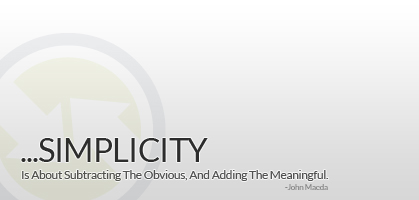May 4, 2012 | 5 Min Read
Minimalist Website Design: What’s the Deal?
Get in touch with us
Reach out to us for any inquiries or support, and let’s connect!
Minimalist Website Design
Before going into any detail on minimalist website designs, it needs to be made clear that no style of web design is better than others. It all depends on what the website is trying to accomplish and the general needs of the customer (after all, that’s who everything we do as web designers is for). This article is only meant to highlight the effectiveness of minimalistic web design and the reasons why it can often times be a successful route to take. With that being said, minimalist does not equate to low quality.

Essentially, a minimal site will be absent of any unnecessary design elements; thus keeping the design, code, and content as clean as possible. A common misconception is that this means the website has to look extremely plain, which is not the case at all. Complex websites have numerous aspects to them that aren’t exactly necessary, but rather artistic additions that serve no purpose other than adding fluff to the page. Minimalism web design and minimalist graphic design will attempt to remove this fluff, leaving behind only the pertinent content. But why do this? What purpose does it serve? We will highlight a few of the key reasons below:
Advantages in Minimalist Web Design
-
Faster load times:: It’s common knowledge in web development that the faster your website loads, the better. The internet has become so vast that there is an almost infinite number of alternative websites that the user can choose to visit. We’ve all tried to access a website, only to click the back button because it took too long to load. And “too long” in this case doesn’t mean minutes; anything over 12 seconds or so and you’re putting yourself at a much greater risk of visitors bouncing off of your site. With a minimalist website design it is much easier to keep the code clean and simple, resulting in faster load times.
-
Information is easier to absorb: Quite a large percentage of visitors on any given website will not take the time to painstakingly go over every aspect of each page; they instead quickly scan the pages to find what they need. For this reason, extremely complex and bogged down sites will often times lose visitors who don’t have the patience to figure out where the information they’re looking for is located. A simplistically designed website will inherently be easier to understand and comprehend, because it has done away with all of the fluff that would have distracted the visitor.
-
Navigation is made simple: A minimalist website usually only contains the most important information in regards to that particular company. This means fewer site pages, and a less cluttered design. By choosing to include only the information your visitors will need, and possibly combining pages that have similar topics, you can greatly reduce the chance of someone leaving your site because they couldn’t find what they were looking for. Make sure that your menus are clear and easy to understand, and that the interface is consistent throughout the website and you will be making the lives of your visitors that much easier.
-
Problems/bugs are easier to fix: With a minimalistic website design, the code being used in the back end will usually be much more streamlined than, and not as cluttered as a complex site. This leads us to the obvious conclusion that whenever a bug arises (which is inevitable in any online business), it will be easier to locate the problem and subsequently fix it.
Simplify Your Site!
By no stretch of the imagination are we saying that minimalism website design is always the right decision. Depending on the industry or what the company is trying to accomplish, there may just be too many functions or needs that the site needs to fulfill. Don’t ever leave out important information or content in order to achieve a simpler design. The easiest way to figure out just how simple you can make your website is to ask, for each and every element of the site, “Is this necessary? How important is it?” Things like unnecessary decoration can usually be removed without doing any damage to the functionality or quality of the website. As mentioned earlier, combining similar site pages can also be an effective strategy in simplifying your website. Just remember that more complex doesn’t always mean better, and simpler doesn’t always mean lower quality.
By: Dana Nevins
More On Related Topic
Explore our highlighted blogs for the latest insights and trends in the industry.
April 2017 Happenings at Web Shop Manager: What You Missed
April Newsletter of events, new website releases, and product enhancementsWe've hit our stride and have been very busy with some awesome new builds, events, and improvements to the platform. In this issue:HDAW/HDAD Recap [VIDEO]April 2017 New...
Pinterest– What Does it Mean for Website Design?
It’s no secret that Pinterest has swept through the internet and captivated an impressive number of people in a short amount of time. For the uninitiated; Pinterest is a relatively new Social Networking site...
💸 Stop the Bleeding: The Hidden Costs That Murder Your Fitment ROI
💸 Stop the Bleeding: The Hidden Costs That Murder Your Fitment ROIPrimary Keyword Focus: Fitment Data Management & Fitment ROIThe difference between a mid-market manufacturer that thrives and one that stalls often comes down...

Ready To Grow Your Business?
Ready to elevate your online presence? Contact Web Shop Manager for expert solutions tailored to your
needs. Let’s build something amazing together.
